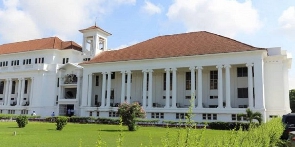Supreme Court grants ‘commercial sex worker’ big win in breach of promise to marry case

Supreme Court overturns decision of Court of Appeal
‘Commercial sex worker’ gives loan of €20,000 to defendant’s brother
After years of walking the corridors of the courts of Ghana to seek justice for the unfairness and deceit she suffered at the hands of a man who once gave her hopes of marriage, a ‘commercial sex worker’ has won her case at the Supreme Court of Ghana.
Ama Serwaa’s win came after she sued Issaka Hashimu, the man who gave her hopes of marriage, and for which reason she committed most of monies to secure a future together with him, only for him to go behind her to marry another.
In a report by dennislawnews.com, it explained that the Supreme Court of Ghana, led by Justice Jones Dotse, upheld the case of the Italian-based ‘commercial sex worker,’ granting her ownership of properties she acquired in Ghana through her intended husband.
In her suit, Ama Serwaa indicated that she and Issaka, both migrant workers, first met in Italy.
Over the period, she said, they fell in love, cohabited, a period which made her develop a firm belief that an imminent marriage was to take place between them.
“As a result, the woman made an arrangement with the man to acquire properties in Ghana and even shipped a vehicle in 2002 which was not accounted for, when she returned to Ghana after having lost her travel documents.
“Additionally, she adds that while she was in Ghana, they cohabited at a rented place at Tantra Hills while their Madina house was still not completed,” the report said.
Further, it is reported that Ama Serwaa moved to their Madina house but claimed she was forced to move out because she was suffering at the hands of Issaka Hasimu and his sister.
Along the way of their broken relationship, she had a stillbirth, which led to mental issues, particularly because of the many challenges she encountered.
It was during this period, the report added, that Ama came to find out that Issaka had gotten married.
In September 2008, she issued a writ against Issaka and one other for breach of promise to marry, seeking among others, “General Damages for breach of promise to marry by 2nd Defendant; Refund of loans to the tune of E20,000 from 2nd Defendant with interest thereon; ½ of the property at Madina and Ajirigano; ½ of the 7 machines brought in with her money which have been in the custody of 2nd defendant as well as an account of proceeds from same to date.”
Also, the plaintiff sought proceeds from the sale of seven cars she sent to him as well as a reimbursement of the sum with interest; and a return of the shop at Makola now occupied by the 1st defendant.
Finally, the plaintiff (Ama Serwaa) sought general damages for the deprivation and any other relief from Issaka Hashimu, on the orders of the court.
Loans to the tune of 20,000 Euros:
The report explained further that during trial at the High Court, Ama Serwaa described how as a commercial sex worker in Napoli, Italy, she made very good money and gave some to the defendant to send to his brother in Denmark who held an account in their joint names as well as giving him “loans” to the tune of €20,000.
“Further, when the defendant returned home to Ghana, to supervise the acquisition of the properties, she sent him some money; and while in Ghana to sell off second-hand shoes she had brought home to sell, she sent the defendant the money through an agent called ‘Joe”, for the purchase of the machines that were subsequently installed at Timber Market,” the report added.
In her defense, the plaintiff said she did not hold back from spending towards the acquisition of the property because she believed they were in the process of getting married.
Additionally, she said that Issaka’s mother had even began guiding her towards her eventual conversion to Islam.
At the end of the trial, Ama Serwaa won the case and was granted her reliefs but a dissatisfied Issaka took the case to the Court of Appeal where the High Court’s decision was overturned in his favour.
But Ama Serwaa refused to concede defeat, taking the case to the apex court of the land; the Supreme Court.
In her December 2019 case at the Supreme Court, she convinced the five-member panel constituted of Justices Yonny Kulendi, Agnes Dordzie (Mrs), and Lovelace Johnson (Ms) with her case.
The judges also made a finding of an error of law committed by the Court of Appeal by not allowing the plaintiff to respond to a new ground on the legality or otherwise of prostitution in Ghana, raised on appeal by the defendant.
In their unanimous decision, the Supreme Court held that the plaintiff, Ama Serwaa, on a balance of probabilities, had proven her claim against the defendant.

Source: www.ghanaweb.com






